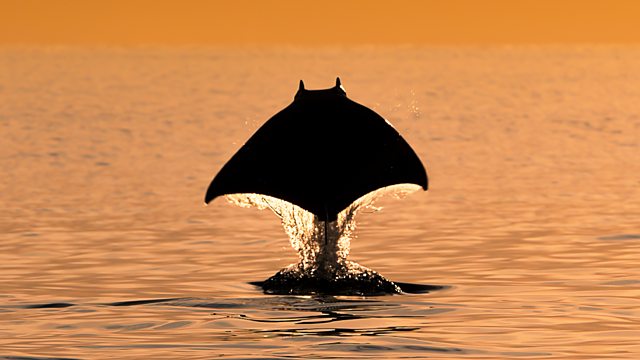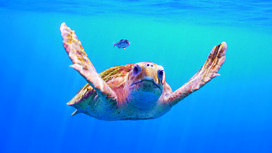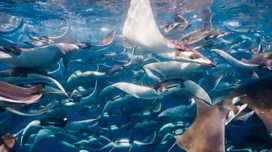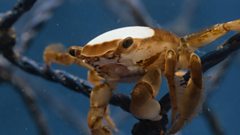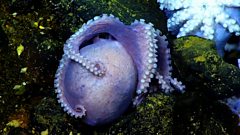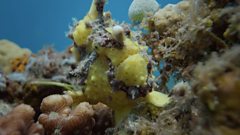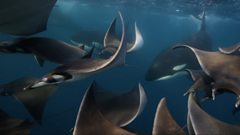Ocean
A groundbreaking journey from tropical shallow seas to the mysterious depths. Sir David Attenborough reveals extraordinary new worlds and unique animal behaviours in the ocean.
Much of our world remains virtually unexplored because most of it is under water. The ocean covers two-thirds of the planet and is home to 80 per cent of all animal life. Yet we know little about it. Presented by Sir David Attenborough, this groundbreaking film journeys through the vast and varied ocean to reveal the extraordinary behaviours and adaptations required for life there.
The shallow seas of the tropics may look like a paradise, but they are a battlefield, where even predators like the deadly lionfish must beware. Nothing is what it seems. The clown frogfish, the reef’s most extraordinary hunter, carries a fishing rod on its head, baited with a shrimp-like lure that can prove fatally seductive.
Away from the tropics, in the cold waters off North America, the sun fuels forests of giant kelp. It is a dangerous place for young horn sharks. Giant sea bass and larger sharks patrol through the kelp. But the real danger is buried beneath. A little horn shark unwittingly stumbles into the ambush of an angel shark. With a lightning strike, it is swallowed whole. But it is not over yet – the little horn shark has a secret weapon.
Winter storms can batter the forest and rip the kelp from the seabed, casting it away into the open ocean. Out in the big blue, the floating kelp becomes a vital lifeline for animals such as flying fish, which use them to lay their eggs. But they must lay thousands because these eggs are on the menu for hungry blue sharks.
Life in the vastness of the open ocean relies on these islands of seaweed, but today they are being replaced by something altogether different – plastic. Every year, 12 million tonnes end up in the ocean. It is lethal to many, but some animals are learning to take advantage of these plastic rafts. Meet the Columbus crab. An open ocean creature with a big problem. Columbus crabs are poor swimmers, so to find a mate, they must hitch a lift. Passing turtles can help, and in fact provide a permanent home for a pair of crabs. In return, the crabs provide an onboard grooming service, a relationship that works so well that these turtles are often home to a devoted Columbus crab couple.
Finding a partner in the ocean is not always easy. In the Sea of Cortez, mobula rays perform astounding acrobatic leaps to attract other rays, resulting in a gathering of vast numbers. All the noise, however, attracts a family of specialist ray-hunting orca that have a unique strategy to catch these fast and agile animals.
The least-known parts of the ocean are its great depths. To venture there requires specialised vessels to withstand the crushing pressure. As you leave the surface behind, sunlight fades and you enter an alien world, encountering a massive siphonophore, longer than a blue whale, and a gulper eel with huge jaws that can engulf prey larger than its own body.
By the time you reach the seabed two miles down, the temperature has dropped to near freezing, so cold that the eggs of a mother pearl octopus would take over ten years to develop. She heads to a special place where warm water escaping from the seabed creates a thermal spa. She is joined by 20,000 female octopuses, all here to raise their eggs – the largest-known gathering of octopus on planet earth. The warm water speeds up her eggs’ development, but it will still take two years and in that time this devoted mother will not leave them, not even to feed. It is an extreme effort that will eventually kill her.
In today’s ocean, animals are having to compete with us. Off the coast of Chile, South American sea lions have learned clever techniques to raid fishermen’s nets – which they now do in their thousands, but it comes with a huge risk. As the net is drawn in, the sea lions must get out quickly, or they risk being crushed and drowned. Sadly, the inexperienced young and pups don’t get out in time, and some pay the ultimate price.
Animals have evolved in remarkable ways to cope with the demands of life in the ocean. But can they now adapt to the new challenge… living alongside us?
Last on
More episodes
Previous
![]()
In pictures: Ocean
Highlights from the second episode of Planet Earth III
![]()
Test your knowledge on Ocean
Did you pay attention during this episode?
Clips
-
![]()
Making Planet Earth III: Filming devoted, deep-sea mothers
Duration: 03:40
-
![]()
A frogfish goes for a walk before a spot of fishing
Duration: 01:51
-
![]()
Orca teach their young to hunt mobula rays
Duration: 01:24
Credits
| Role | Contributor |
|---|---|
| Presenter | David Attenborough |
| Production Manager | Bronwen Thomas |
| Executive Producer | Michael Gunton |
| Series Producer | Matt Brandon |
| Series Producer | Jonny Keeling |
| Producer | Will Ridgeon |
Broadcasts
- Sun 29 Oct 2023 18:20
- Sun 5 Nov 2023 15:50±«Óãtv One except Wales & Wales HD
- Tue 19 Dec 2023 08:00
Explore AR animals and their habitats in ‘Habitat Explorer’ or order a poster ‘Our Changing World’ to make origami animals!
Visit The Open University website to learn about fascinating animals in their habitats
